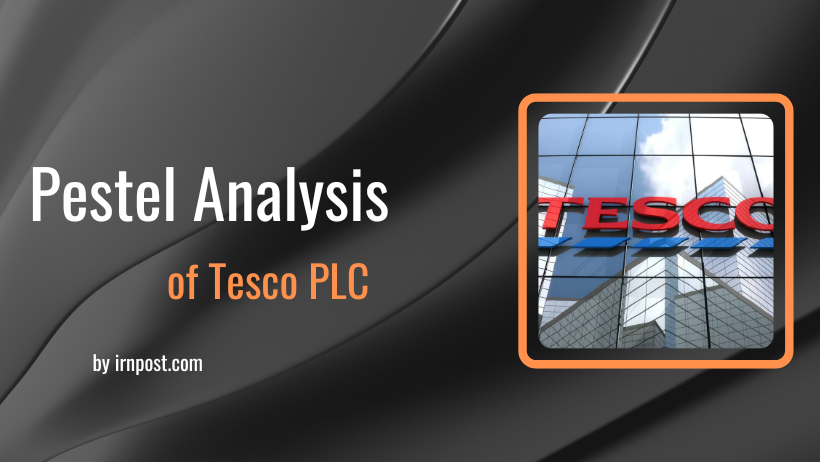Business
Pestel Analysis of Tesco PLC

PESTEL or PESTLE analysis, is a tool used to evaluate the external macro environment of an organization. This framework looks at the Political, Economic, Social, Technological, Legal and Environmental factors that can have an impact on the business. PESTLE Analysis of Tesco plc will help us understand how these external factors can impact the business.
Political Factors of Tesco plc
The UK is one of Tesco’s major markets and the recent Brexit vote has created uncertainty around the future of trade between the UK and the rest of Europe. This could impact Tesco’s supply chain and costs, as well as consumer confidence.
The political factors affecting Tesco plc are the governmental policies and regulations that can impact the company’s business operations. These can include tax laws, trade restrictions, labour laws, and environmental regulations. The company must comply with all applicable laws and regulations in order to continue operating smoothly.
The current government in the UK is supportive of businesses and has introduced policies that encourage growth and investment. This is positive for Tesco plc as it indicates a favourable business environment. However, the government can also introduce new laws and regulations that can impact the company’s operations. For example, if the government were to increase taxes on retail companies, this would likely have a negative effect on Tesco’s profitability.
Economic Factors of Tesco PLC
Tesco plc, together with its subsidiaries, operates as a grocery retailer in the United Kingdom, Ireland, and internationally. The company offers food and groceries; electrical and home appliances; books, music, games, and DVDs; dresses and shoes for women, men, and children; beauty products; health products; household items; baby products; and toys. It also provides fuel and car care products, financial services, and broadband and mobile phones. Tesco plc operates as a subsidiary of Tesco Corporation.
The current economic conditions in the UK are challenging, with inflation rising and consumers feeling the squeeze. This is likely to impact Tesco’s sales and profitability.
Social Factors of Tesco PLC
The social factors affecting Tesco plc are varied and complex. The company must consider the general public’s perception of the company, as well as any specific groups that may have an impact on its business. These can include customers, employees, shareholders, suppliers, and local communities.
The company must also be aware of social trends that could affect its business, such as changes in demographics, lifestyle trends, and attitudes towards spending.
Tesco plc must also ensure that its policies and practices comply with relevant legislation and regulations, such as those relating to employment, health and safety, and the environment.
The company’s approach to social responsibility is also an important factor to consider. Tesco plc has been widely praised for its work in this area, which includes initiatives to reduce food waste, support local communities, and promote healthy eating.
The social trend of healthy eating is continuing to grow, with more consumers looking for healthy options when they shop. This presents both an opportunity and a challenge for Tesco, as they need to ensure they offer products that meet this demand.
Technological Factors of Tesco PLC
The technological factor has a very important impact on Tesco. Technological change can cause problems for Tesco, as the company has to continuously update its systems and services to maintain a competitive edge. For example, the development of online grocery shopping has been a challenge for Tesco, as it has had to invest heavily in order to catch up with its rivals.
However, Tesco has also been able to use technology to its advantage. The company’s use of customer data has allowed it to target its marketing and promotional activity more effectively, resulting in increased sales and profits. In addition, the development of self-service checkouts and delivery services has helped to improve efficiency and reduce costs.
Looking to the future, it is clear that technology will continue to play a major role in Tesco’s business. The company is likely to invest further in online shopping and delivery services, as well as exploring new ways to use customer data to drive sales.
Technology is playing an increasingly important role in the retail sector, with consumers using online and mobile channels to research and purchase products. Tesco needs to ensure it is investing in the right technology to meet the needs of its customers.
Legal Factors of Tesco PLC
The legal factors that affect Tesco plc are mainly related to government regulations and compliance with industry standards. Government regulation can have a significant impact on the way Tesco operates, as it can dictate what the company can and cannot do. For example, if the government were to regulate the food industry more strictly, this could have a major effect on Tesco’s business. compliance with industry standards is also important for Tesco, as it helps to ensure that the company’s products and services are of a high quality and meet customer expectations.
There are a number of legal issues that could impact Tesco, such as the ongoing investigation into the company’s accounting practices.
Environmental Factors of Tesco PLC
The business model of Tesco plc is based on the company philosophy of creating value for money for the customer. This philosophy extends to the environmental sustainability of its operations. To ensure that it meets its environmental obligations, Tesco has adopted a number of policies and procedures. The most significant of these are discussed below.
Tesco recognises that the efficient management of waste is essential to minimising the company’s environmental impact. In order to reduce the amount of waste produced by its stores, Tesco has introduced a number of initiatives.
The issue of food waste is an important environmental issue that Tesco is working to address. The company has set a target to halve food waste by 2025.
We have discussed PESTLE analysis of TESCO PLC above. Also each of the factor has been elaborated well according to the analysis.




















